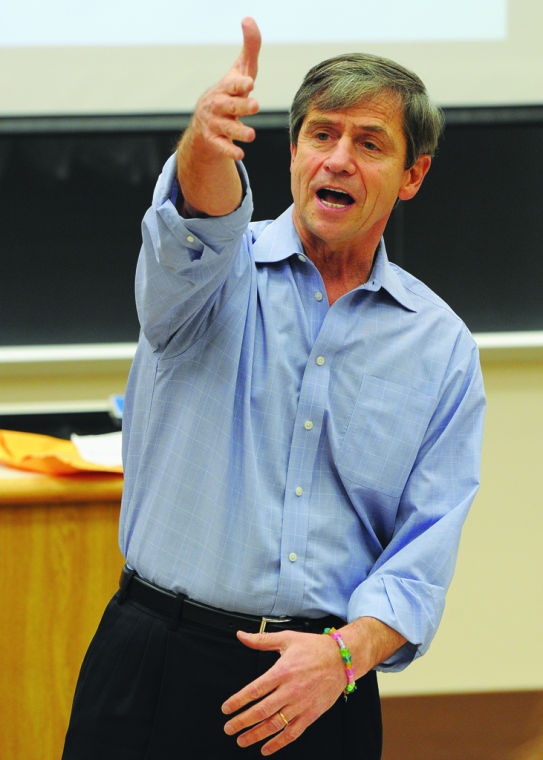Former Congressman visits campus
February 26, 2014
A prospective candidate for the U.S. Senate visited Pitt to answer questions from students about issues prevalent in both Pennsylvania and the nation.
Three-star Navy Adm. Joe Sestak met with the Pitt Law Democrats on Tuesday to lay groundwork for his 2016 campaign for a seat in the Senate.
Sestak, 62, the highest-ranking military official ever elected to Congress, represented Pennsylvania’s 7th congressional district from 2007 to 2011. He currently teaches political science courses part-time at both Carnegie Mellon University and Cheyney University.
In 2010, Sestak ran a highly publicized campaign against the Democratic establishment candidate Arlen Specter. Sestak won the primary, but lost in the general election.
When asked about his mistakes in that election, Sestak blamed himself.
“I wasn’t smart enough. I wasn’t good enough,” Sestak said. “I was accountable.”
But now, after serving four years in Congress, Sestak has more experience.
During the hour-long talk in the Barco Law Building, he recalled being on Capitol Hill during the beginning of the recession. According to Sestak, some Democrats were afraid of taking action for fear of public blame.
“Where is the accountability?” Sestak asked. “People need to trust that [their leaders] are willing to go down with the ship to do what’s right.”
Pitt Law Democrats campaign liaison Daniel McArdle Booker said he was impressed by how Sestak owned his 2010 loss.
“I worked in politics for a while, and the ones that lose are the ones that blame outside forces,” Booker said. “It’s good to see him taking responsibility.”
About twenty students attended the talk, and Sestak answered questions on issues such as drug sentencing reform, sexual assault in the military and natural gas.
Regarding drilling for natural gas, Sestak said the state government should close the Halliburton loophole, which exempts hydraulic fracturing from regulation under the Energy Policy Act of 2005, and start taxing the natural gas profits.
“I’m a supporter of drilling with the proper oversight,” Sestak said. “We are the only state that doesn’t tax it.”
Sestak said it was important to bring gas companies to Pennsylvania but pointed out that many of the jobs such companies create are temporary.
“It’s not about jobs,” Sestak said. “It’s about quality jobs.”
Sestak reflected on his military experience when discussing sentencing reforms, focusing on incarcerated veterans and recidivism rates.
“Forty-seven percent of veterans are incarcerated for drug- or alcohol-related crime,” Sestak said.
According to the Drug Policy Alliance, veterans often turn to drugs to combat post-traumatic stress disorder.
Sestak also said there was a 92 percent increase in women’s incarceration and that the best way to fight the rates of habitual relapse into crime is extending postsecondary education.
According to Corrections Connection Network News, a drop in high school graduation rates among young women leads to poverty, which is linked to criminal activities. The drop in graduation rates has propelled the increase in women’s incarceration.
In response to a student’s question on sexual assault in the military, Sestak said he opposes taking prosecution outside of military courts. According to Sestak, the military operates by resolving issues without external involvement. He pointed to Congress as an institution that involves others to take care of its problems.
“[Congress] outsources accountability,” Sestak said. “The military is pretty darn decent at accountability.”
Sestak said military officials responsible for letting rape go unpunished should be relieved of command. Years ago, the military faced similar internal problems with race and moved past them, according to Sestak.
Pitt Law President Ian Everhart said he was glad Sestak could drop by between a radio interview and fundraising events.
“He’s up and down all over the state,” Everhart said.
Everhart and Booker commented on Sestak’s enthusiasm.
“He’s still got that energy,” Booker said.
Everhart said he remembered seeing the candidate in 2010 racing up and down Grant Street and Boulevard of the Allies Downtown shaking hands and interacting with as many people as he could.
“That’s what you see here,” Everhart said.








